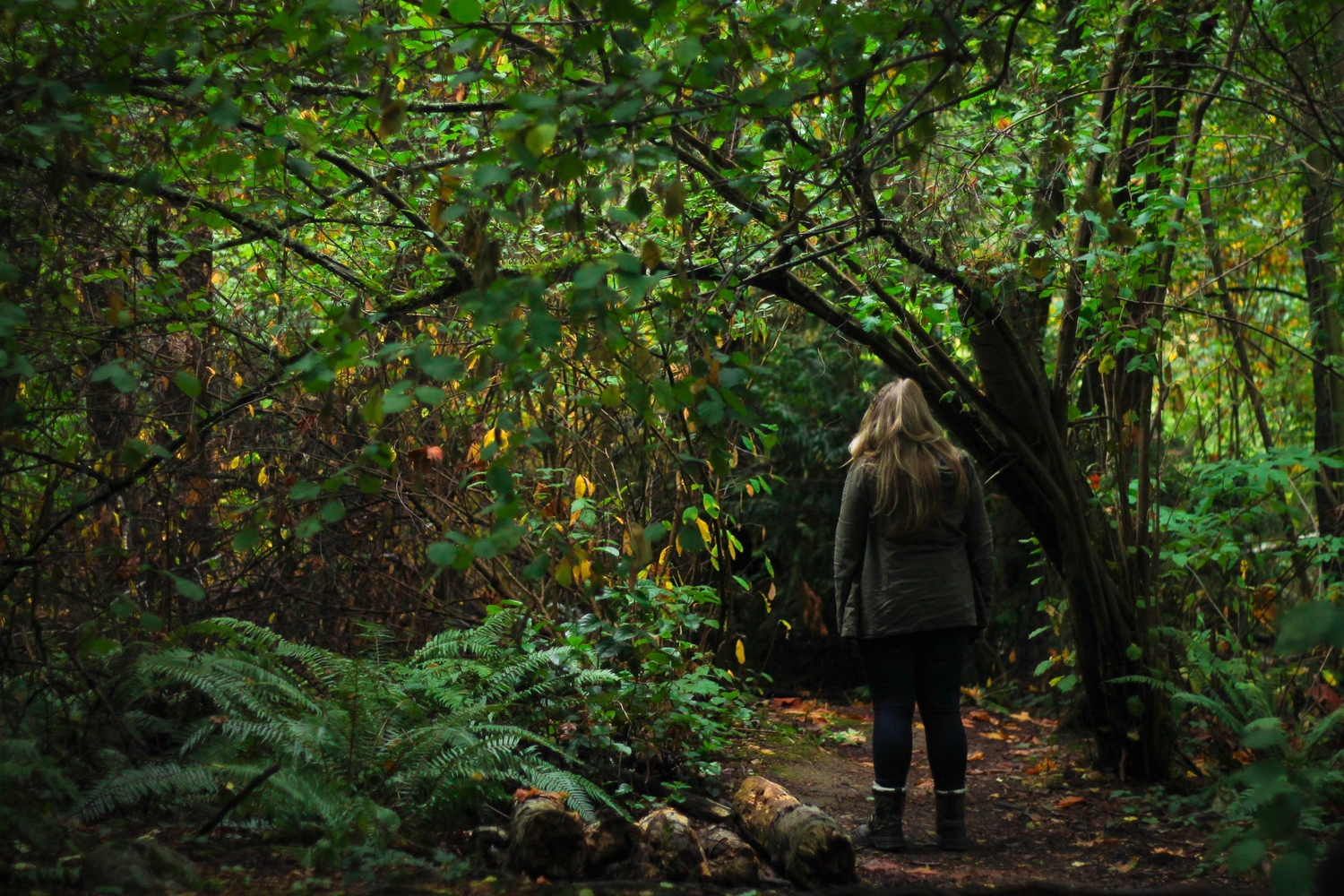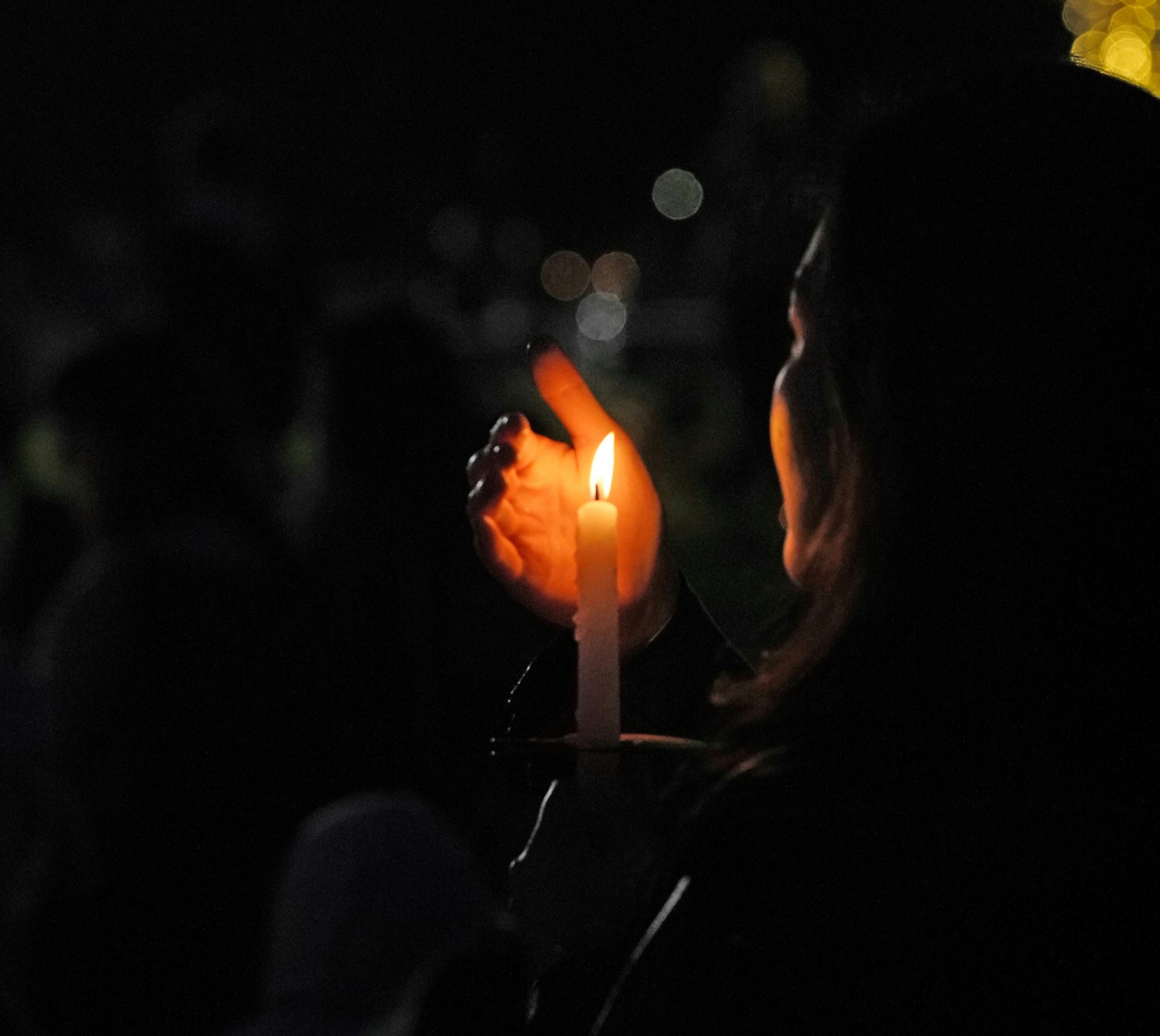interviews
A Woman and Her Imaginary Friend Disappear into the Wilderness
Amanda Goldblatt on her novel "Hard Mouth" and the search for escape

Imagine that the charming, audience-addressing protagonist of Phoebe Waller-Bridge’s runaway-hit TV show Fleabag was—instead of a jumpsuit-wearing café owner in London—a reclusive lab tech in the suburbs of Washington, DC. Imagine that character addressing readers with Fleabag’s charm and humor, but, rather than talking about the hot priest she’s in love with, she’s talking about her plan to disappear to a wholly isolated cabin somewhere in the remote East Coast woods. That’s Denny, the protagonist of Amanda Goldblatt’s stellar debut, Hard Mouth. Denny, like Fleabag, is an inveterate fourth-wall-breaker, narrating her own behavior with perfect control even as she struggles to control herself.
Denny has her reasons for disappearing. Her father has been battling cancer since Denny was a teenager, and the trauma of his repeated brushes with death has made Denny highly detached and self-protective. When he receives yet another cancer diagnosis, he decides not to fight it, and Denny can’t tolerate her own grief. Instead, she disappears into the wilderness, accompanied only by her imaginary friend, an old-Hollywood blowhard named Gene who speaks in clichés and disturbing anecdotes and, though Denny begs him for comfort, never seems to have much to offer.
I interviewed Amanda Goldblatt by email about Denny’s time in the woods and in the Maryland suburbs, her struggles to control her life and fate, and, of course, her relationship with Gene—who, for the record, is the realest-seeming imaginary friend I’ve encountered since my own exited my life 20 years ago. I’ve missed him periodically, but, now that I’ve met Gene, I’m less sorry that my imaginary friend is gone.
Lily Meyer: Why was it important to put Denny-the-narrator (rather than Denny-the-character) in “the position of making my story,” as she puts it?
Amanda Goldblatt: Any first-person work is a presentation or performance. This is particularly true for Denny, I think, who is set on presenting her experience of herself and this part of her life in a controlled manner. She subordinated herself, or let her circumstances subordinate her, throughout most of her youth. The novel encompasses the moment where she, at last, dominates her own life, and Denny is proud of that; she is talking to herself, telling herself, as much as she is offering the story to anyone else.
LM: At what point in the writing did you begin having Denny break the fourth wall and start addressing the reader directly? Does her relationship with Gene enable her to do that more easily than other narrators might?
Her transgression to the mountain is not only social and emotional but physical, corporeal.
AG: Early in the drafting, Denny was telling the story to a specific person. In later revisions, this dropped away simply because it wasn’t needed, though the direct address remained. This is in part because I see all first-person narrative as a conscious act of storytelling—one that is mimetic to the practice of writing itself. Denny’s impulse to directly address the reader (or audience) follows. She is a conscious and self-conscious narrator. She might as well be talking to a mirror.
Denny’s also used to seeing herself as partly dislocated or fractured; you so rightly make the connection here to Gene. Another interviewer, Anne Yoder at The Millions, recently commented on her tendency toward compartmentalization—Denny reserves her own apartment, and later, hopes to reserve the mountain, for her own solitude. Her direct addresses signify a performative willingness to puncture this compartmentalization, but only while she’s in her role of narrator. It’s not a conversation; it’s a performance.
LM: What imaginary friends in books or movies, if any, did you use as models for Gene and Denny’s relationship? Did you have an imaginary friend growing up?
AG: I wrote Gene, basically, as a real person who happened not to entirely share Denny’s reality. That was important to me—his insistence on independent selfhood is integral to how he operates, and how I think imaginary friends operate in general.
Recently I watched the trailer for Drop Dead Fred, a 1991 movie about an adult woman whose childhood imaginary friend returns to destabilize her life through comedic and inappropriate chaos. I did not think about this when I wrote the relationship between Denny and Gene, though I did watch the movie somewhat obsessively in the fifth and sixth grades, and I wouldn’t be shocked if those viewings situated my understanding of imaginary friends in a very particular way.
I was raised as an only child and was very jealous of my friends who had siblings, particularly ones that were one or two or three years older or younger. A friend of mine who is raising an only child always asks for assurance, that being an only child isn’t torture, and it wasn’t, but was sometimes quite lonely. As an only child I had a tendency to dramatize this, perhaps as a way to amuse myself. I do remember thinking that an imaginary friend would be handy. But I was practical too: imaginary friends seemed to have to be naturally occurring, and though I waited, none ever showed.
LM: What kind of wilderness or survivalist research did you have to do to write the section of the book that takes place in the woods?
AG: I was careful to do about the same amount of research that Denny did. As I cite in the acknowledgements, the two wilderness books that Denny uses are the ones I used too. One of those books I found in a thrift store in Michigan. Another I found on a clearance table at a bookstore. A kind of gonzo or method-acting procurement in these, maybe. I spent a fair amount of time on survivalist discussion forums, most of which were fairly old in internet terms, (updated around 2009 at the latest, just slightly later than when the book takes place). Besides that, I went out to the woods (in different places) a lot and took notes and put language to the woods. Also: I shot a gun, which I had never done before. By my 30th birthday, it became clear that Denny was going to shoot a gun. On my birthday, my partner and I went to an outdoor shooting range outside Louisville. It was loud and informative.
LM: How did you arrive at the proper suburbs-woods balance? Why does it take Denny half the novel to leave Maryland?
AG: Previous to the novel I had spent my writing life avoiding the suburbs. I left the suburbs at seventeen, basically, and have lived in small towns or large cities ever since. But in 2010 I was asked if I wanted to teach a suburb-themed fiction workshop. We read, of course, Cheever’s “The Swimmer,” and other dominant-narrative suburban stories, but I also spent a lot of time with newer fiction and extra-disciplinary texts about big box stores and ethnoburbs and HOA rules and it was an opportunity to re-approach where exactly I’d grown up. (I spent a lot of time looking at the catalog for the Walker Art Center’s 2008 “Worlds Away: New Suburban Landscapes.”) Some of these documents better reflected the suburbs I experienced; a lot of the 20th-century cultural narratives of the suburbs, from Revolutionary Road to The Virgin Suicides, rely on an idea of their normalcy or uniformity in order to talk about human desperation. But in these other texts, I saw the suburbs as a more dynamic space, one that was much more about individualized patterns than normalcy, and one that seemed more reflective of my experience. Talking about normalcy is talking about established social expectation, but talking about patterns remembers more keenly physicality and intersection and solitude.
Anything that promotes disease or decay—junk food, alcohol, bad posture, the passage of time—is in some way suicidal.
In the book, I was interested in establishing Denny’s suburban patterns—in living, in driving—as she moves through the same or similar spaces, from private to public space, across highways and past churches and schools and strip malls. Her transgression to the mountain is not only social and emotional but physical, corporeal. A pattern has to be well established, if anyone is going to care about its disruption.
In a classic adventure novel, it’s all survival and action in unfamiliar places. But for me, this book is about the impossibility of survival in any context. Survival of the physical self, and also a more philosophical, existential survival. Allowing Denny a character to reckon with that (or not) at home, and also on the mountain, allowed for a more expansive exploration.
LM: Does Denny go to the woods to kill herself? Or to “live deliberately,” per Thoreau? Or both?
AG: I think she decides to leave her life. She makes that one decision. And, reasonably, she understands that she may die, that she may be hastening the end of her life. And she’s okay with that. She understands, in the impending death of her father, that everything human is finite. That she is no special thing. She is not a survivalist, and maybe that’s suicidal. In that very human logic, anything that promotes disease or decay—junk food, alcohol, bad posture, the passage of time—is in some way suicidal.









